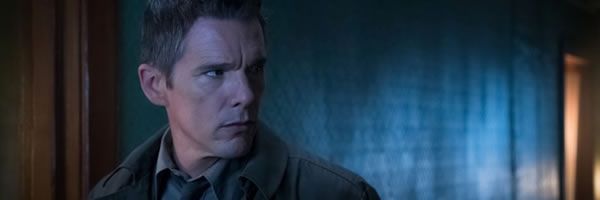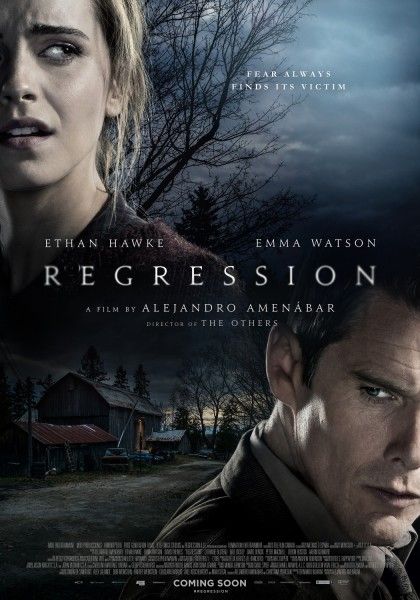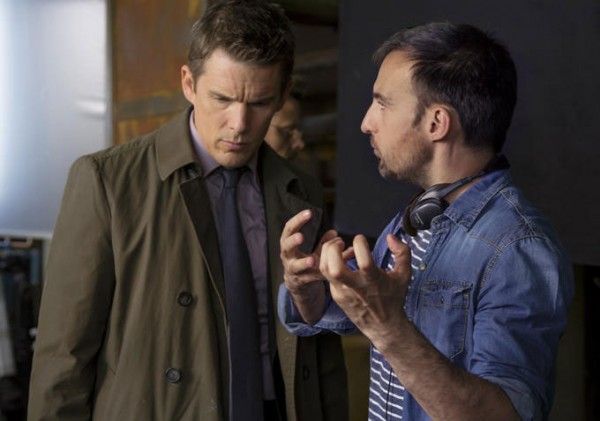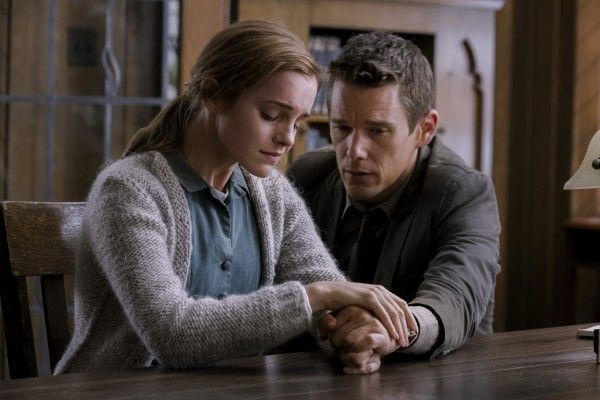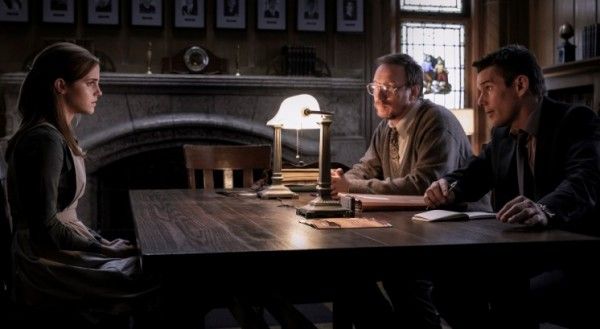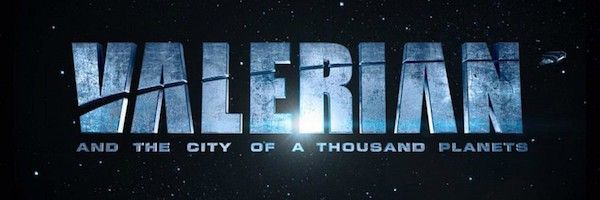With Regression opening in theaters this weekend, I recently sat down with its star, Ethan Hawke, who plays a detective investigating the rape of a young woman (Emma Watson) whom he suspects is being sexually abused by her father (David Dencik). He enlists the help of a psychoanalyst (David Thewlis) who specializes in regression therapy which leads to the discovery of a satanic cult. The dark and disturbing supernatural thriller was written and directed by Alejandro Amenábar.
In our interview, Hawke revealed how the project first emerged after Amenábar saw him in Macbeth at New York’s Lincoln Center, how he took a gamble because it was unlike anything he’d ever done before, why he considers Amenábar a fascinating filmmaker and wanted to help him realize his vision, what it was like being surrounded by such a strong cast, his most memorable moment on set, the responsibility he feels to help a younger generation of actors, the great advice Norman Lloyd gave him about being an actor, his experience making The Magnificent Seven with Antoine Fuqua, Denzel Washington and Chris Pratt, and playing a space pimp in Luc Besson’s new sci-fi adventure, Valérian and the City of a Thousand Planets. Check it all out in the interview below:
How did this project first come about?
ETHAN HAWKE: I was actually doing Macbeth at Lincoln Center in New York, which is in a lot of ways the original scary movie, and Alejandro Amenábar came to it. He’s a very interesting filmmaker. I had really liked The Others, which was a movie he made with Nicole Kidman a few years ago. He made a very compelling case about how much he wanted me to be in this movie. Whenever a really passionate, talented filmmaker seems to have an interest in me, I take it very seriously because I like to work.
What was your reaction when you first read the script?
HAWKE: That I didn’t understand it at all. (Laughs) Largely, the reason I did this movie, for me, didn’t have to do with the script. It really had to do with Alejandro. He has a unique way of approaching movies and thinking about something which was new to me. It was different. I have a lot of respect for him so I just took a gamble. The script wasn’t the draw for me. It was largely Alejandro and his way of talking. To hear him talking about the script was way more interesting than the script. He wrote it, and so, English is his second language. It’s an interesting thing. I’ve had that before. I was directed by Alfonso Cuarón before, too. It’s always interesting when you’re being directed by somebody like that. So much of directing is about communication, and finding the right words, and what it means, and how to convey certain emotions and ideas. So, it’s always a unique challenge when you’re working with somebody where English is their second language. My Spanish is terrible. I’ve worked with a French director before and various different people.
What was it about the story and your character that resonated with you?
HAWKE: I did this movie right after it about the life of Chet Baker. It’s called Born to Be Blue. In that situation, there’s a real clear character you’re drawing on. It’s a real person. It’s really exciting and interesting to do the research to figure out how to make that a nuanced, three-dimensional human being. With Alejandro, he was really inviting us to enter his dream landscape. It really wasn’t based on reality. So, in a lot of ways, I just had to put myself in his hands and go with it, because I really didn’t understand where it was coming from on the page. It was so much about that world that is not realism. What is regression? What state is that set in? What cop dresses like that? I struggled with it a lot. Finally, I had to give in to understanding that this movie was happening inside Alejandro’s imagination and just try to help him do it.
How was it working with Alejandro Amenábar? What was the directing process like?
HAWKE: Very clear. I’ve very rarely worked with somebody that had such a clear idea of what he wanted to do and what he wanted to achieve. The guy is incredibly prepared. He was clearly making a movie for himself and his own dream. I just tried to be a part of that dream. It’s a rare opportunity. I don’t have a lot of experiences like this where every time I thought I had a good idea it was totally wrong. I had to give in completely and just try to make the movie he was trying to make.
Was there a scene that was particularly fun or challenging for you?
HAWKE: I think the most challenging part of it was giving over into it. It’s hard for me to answer that. Not really. There wasn’t one.
Did he allow you to go off script and try things or did he keep it pretty tight?
HAWKE: No, not at all. It was a really strange experience. It was very creative for him. It was almost like it was the most I ever felt like I was helping someone paint. They had a very clear idea of what they wanted it to look like, sound like, be like. So, there was no operating outside the box. The only way to help him was to try to really be a part of his imagination and try to make it happen. He’s a super kind and loving person. So, you wanted to help him. It just was none of my normal ways of helping a director work at all. So, it was a unique experience for me that way. I love working on scripts. I love coming up with ideas about what people would dress like or talk like. I love all that. But, anytime I had an idea, it was wrong. (Laughs) So, I just gave up and put myself in his hands.
How was it working with such a strong cast that included Emma Watson, David Thewlis, David Dencik and Lothaire Bluteau?
HAWKE: The whole cast was great. They surrounded me with these amazing people. There’s the guy who plays Emma’s father, David Dencik. Emma Watson is my kids’ favorite actor on the planet. They never took me more seriously than when I was working with her. David Thewlis is one of the great actors. He gave one of my favorite performances of all time in Naked. Lothaire Bluteau, who plays the priest, gives another one of my favorite performances in Jesus of Montreal. So, I was surrounded with great people.
Is there a moment you’ll always remember from working on Regression?
HAWKE: I enjoyed meeting Emma. I have a soft spot in my heart for child actors growing up. I know how hard that is. Having gone through that experience myself, I have a lot of sensitivity to it. For lack of a better word, I just feel like I love these kids, and I want them all to grow up and love themselves, and not get caught up in the wrong things, and to learn all the different things this profession has to give, and to understand it. I know that it’s impossible for them not to know that it’s an incredibly hard road ahead for them. It’s not going to be easy. It’s interesting to work with Emma so quickly after Harry Potter. When we shot this movie, it wasn’t that long after Harry Potter was finished, and it’s knowing that’s a big transition in her life. She’s a very talented young woman. In a way, that’s what I’ll take away. It’s interesting to get older and realize that part of your job growing up in this profession is to help the next generation. More and more, with Boyhood and with Ellar Coltrane and with Emma, I start to see that role. There’s no better way. Nobody wants advice, so you can’t really give it. You just have to try to wish them well on their journey.
What’s the best advice you ever got about being an actor?
HAWKE: It was when I was on the set of Dead Poets Society. There was this actor who played the principal. His name was Norman Lloyd. He was one of the original members of Orson Welles’ Mercury Theater Company as well as he’s done a lot of wonderful work over his career. One day we were all goofing around on set, all us kids, and he took us all aside and said, “You know, you guys don’t even understand what a powerful experience you’re having. You don’t really understand what a gift this is.” We were going, “What does he mean?” It was that really wonderful opportunities aren’t to be taken for granted. There’s only so often you’re going to have an opportunity to contribute at a high level and that you should be grateful whenever one presents itself and not take it lightly. For some reason, I often found that it had embedded itself in my memory. It just makes sense to remember gratitude and the place that gratitude should have in your life, and that none of us are owed these wonderful experiences, and we should always make the best of them. Norman is still alive. Norman is a really interesting person.
What was it like making The Magnificent Seven?
HAWKE: It was awesome. It was fantastic to be on the set again with Denzel (Washington) and Antoine (Fuqua) and then to have the situation be so different. We weren’t making a sequel to Training Day. We were in the middle of the desert riding around on some horses. We had Chris Pratt there who’s quickly turning into a national treasure and Vince D’Onofrio who’s one of my all-time favorite actors. And I was introduced to some new guys – a Mexican actor and a Korean actor and a Native American actor – all of whom were wonderful. Manuel Garcia-Rulfo and Byung-hun Lee and Martin Sensmeier. So, it was a great experience. It was what you call an adventure. Some movies are work, and some movies are all about acting and character, but this was about learning to ride a horse and shoot a six-gun at the same time. I really enjoyed it.
Where were you shooting?
HAWKE: Louisiana and New Mexico.
As a huge fan of The Fifth Element, it’s great to see Luc Besson back making a sci-fi movie. What’s it been like working on Valérian and the City of a Thousand Planets?
HAWKE: I have a tiny part in that. I play a space pimp. Like you, I’m a huge Besson fan. The Fifth Element, I just loved that movie. Luc cast me to play a small part in it, and so I did, because I love all his movies actually -- The Big Blue, La Femme Nikita, Léon: The Professional. His movies are so wonderful. It’s just fun to be in it and for it to be a sci-fi movie.
Regression opens in theaters on February 5th.

